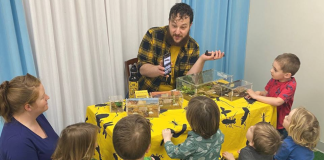
Everyone’s experience with at-home sex education was different. Some people’s parents always encouraged open communication and were happy to answer questions, some refused to acknowledge the subject altogether, and then there are many scenarios that fall in between those two ends of the spectrum. When I ask people if and how their parents talked to them about sex, I frequently hear similar stories of how their mom or dad sat them down one time as a teenager and presented an awkward, bumbling, and embarrassing “talk” that left the adolescent with more questions than answers. Instead of avoiding it, I encourage parents to have several age-appropriate conversations with their children throughout their whole lives to foster a healthy, matter-of-fact attitude towards sex.
Building a Foundation
Talking to your children about sex starts early in life with basic concepts: anatomy and consent. Neither of these is inherently sexual, however, they are a great foundation to build on as your children start to ask about more complicated topics.
Anatomy: As babies discover different parts of their bodies, we teach them the appropriate anatomical terms. We play games where we ask our toddlers to show us their eyes, lips, ears, elbows, toes, etc., we praise them for the correct answers, and that tends to feel totally normal to parents. However, when it comes to words like penis, testicles, vulva, and vagina, some parents might get uncomfortable. If you’re someone that cringes at this thought, remember that these are just words, and how you teach them to your kids is going to influence how they think about those body parts. While these words do refer to genitalia, they are neither inherently sexual or shameful – they are parts of our anatomy. Discouraging your kids from learning about any part of their body can lead to confusion… Why won’t my mom (or dad) tell me about this? Is there something wrong with me? Did I do something wrong?
Consent: I’m “a hugger”, but I acknowledge that not everyone is ok with physical contact, and I think it’s important to take the same approach with kids. Forcing any physical touch – even a simple hug or a fist bump – could make some children uncomfortable. Whether it’s a phase or a lifelong thing, no one owes anyone else any type of physical contact. Sara Farrell Baker’s piece, Stop Guilting My Kids for Not Hugging You, is a really good read on this.
Informed, confident children are also safer. While no one wants to think about the possibility of their child being abused, offenders are more likely to target naive, uninformed kids. Knowledge really is power!
If you struggle with the thought of talking to your kids about sex, I’d also encourage you to reflect on why you’re finding it difficult. Maybe your own sex ed was lacking and you feel like you just don’t have good info to pass on. If that’s where you’re stuck, I recommend the Sex Positive Families’ reading list arranged by age-appropriateness. Maybe you had a traumatic experience that’s blocking you from being able to talk to your kids. If communicating with your children about a matter-of-fact subject makes you uncomfortable, take some time to unpack those feelings and address them so that you can help your kids have healthy attitudes towards sex, relationships, and their bodies.










